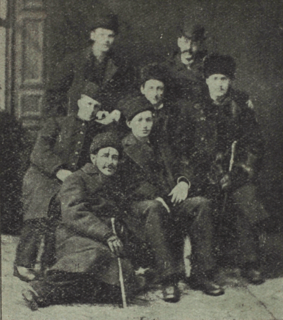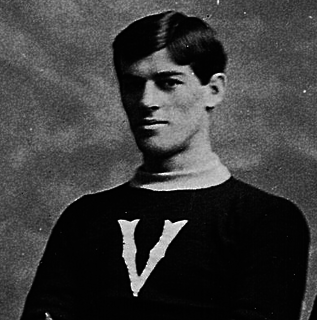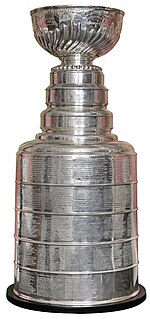
The Winnipeg Victorias were a former amateur senior-level men's amateur ice hockey team in Winnipeg, Manitoba, organized in 1889. They played in the Manitoba Hockey Association (MHA) in the late 19th and early 20th centuries. The Victorias won the Stanley Cup in February 1896, 1901 and January 1902 while losing the Cup in December 1896, February 1899, February 1900, March 1902, and February 1903. After the Stanley Cup became the professional championship, the Victorias continued in senior-level amateur play, winning the Allan Cup in 1911 and 1912.
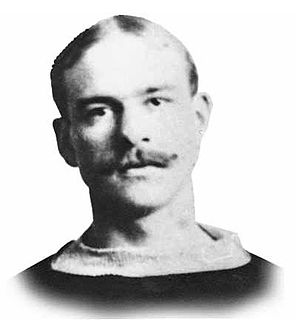
Michael Grant was a Canadian ice hockey player. He played nine seasons of senior amateur hockey between 1894 and 1902 for the Montreal Victorias and Montreal Shamrocks. Grant was a member of the Victorias squad that won or retained possession of the Stanley Cup five times between 1895 and 1899 during the trophy's challenge era. Grant played cover-point and was known for his speed and skating ability. He is regarded as one of the first defenceman to rush forward and with the puck. He was inducted into the Hockey Hall of Fame in 1950.

Harry George "Hap" Holmes was a Canadian professional ice hockey goaltender. As a professional, Holmes won the Stanley Cup four times, with four teams. He tied the record of his 1914 Stanley Cup winning Toronto Blueshirts teammate Jack Marshall, who also won Cups with four teams. No other player has duplicated this record.

The Ottawa Senators were an ice hockey team based in Ottawa, Ontario, Canada which existed from 1883 to 1954. The club was the first hockey club in Ontario, a founding member of the National Hockey League (NHL) and played in the NHL from 1917 until 1934. The club, which was officially the Ottawa Hockey Club, was known by several nicknames, including the Generals in the 1890s, the Silver Seven from 1903 to 1907 and the Senators dating from 1908.
The 1895 Amateur Hockey Association of Canada season lasted from January 3 until March 8. Each team played 8 games, and Montreal Victorias were first with a 6–2–0 record. After a required Stanley Cup challenge played between the 1894 winners, Montreal HC and Queen's, champion of the Ontario Hockey Association, the Victorias inherited the Stanley Cup as league champions.
The 1896 Amateur Hockey Association of Canada season was the tenth season of play of the league. Each team played eight games, and Montreal Victorias were first with a 7–1 record. During the season, on February 14 the Victorias hosted a Stanley Cup challenge match with the Winnipeg Victorias club. Winnipeg won 2–0 to win the Cup.
The 1897 Amateur Hockey Association of Canada season was the eleventh season of play of the ice hockey league. Each team played 8 games, and Montreal Victorias were again first with a 7–1 record, retaining the Stanley Cup. The club won the Stanley Cup back from the Winnipeg Victorias prior to the season. This was their third-straight league championship.
The 1898 Amateur Hockey Association of Canada season was the twelfth and final season of the league. Each team played 8 games, and Montreal Victorias were again first with an 8–0 record, to retain the Stanley Cup. This was their fourth-straight league championship. The league would dissolve prior to the next season.
The 1899 CAHL season was the inaugural season of the Canadian Amateur Hockey League. Teams played an eight-game schedule. The Montreal Shamrocks were the league champion with a record of seven wins and one loss. Both the Shamrocks and the Montreal Victorias won Stanley Cup challenges to retain the Stanley Cup for the league.
The 1903 Canadian Amateur Hockey League (CAHL) season was the fifth season of the league. Teams played an eight game schedule. Ottawa and Montreal Victorias tied for the league championship with records of six wins and two losses. Ottawa defeated the Victorias in a two-game playoff to win the season and their first Stanley Cup championship, the first of "Silver Seven" era.
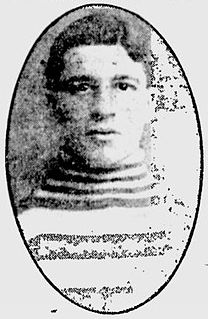
William Robert Hague was a professional ice hockey goaltender. He won the Stanley Cup with the Ottawa Hockey Club in 1905. He played in three other Stanley Cup challenges during his career.
The 1968 Stanley Cup Finals was the championship series of the National Hockey League's (NHL) 1967–68 season, and the culmination of the 1968 Stanley Cup playoffs. It was contested between the Montreal Canadiens and the St. Louis Blues. The Canadiens swept the best-of-seven series in four games. It was the first Stanley Cup Finals after the NHL expansion to twelve teams. Although the series was a sweep, it was a much more intense and close-fought series than anyone had expected, as each of the four games was decided by one goal.
The 1935 Stanley Cup Finals was contested by the Montreal Maroons and the Toronto Maple Leafs. The Maroons would win the series 3–0 to win their second and final Stanley Cup. The Maroons are the last defunct team to ever win the Cup, as the team would disband three years later.
The 1895 Ottawa Hockey Club season was the club's tenth season of play. After qualifying for the final championship match in 1894, the club placed second in the league.

Robert Ernest MacDougall was a notable Canadian ice hockey player and businessman. He played in the early days of organized ice hockey, before professionalism. He played the position of forward for the Montreal Victorias and was a member of five Stanley Cup-winning teams.
Shirley Davidson was a Canadian ice hockey player for the Montreal Victorias during the late 19th century. He was a member of several Stanley Cup Championship teams in the 1895, 1896 and 1897 AHAC seasons.
The 1896 Manitoba Hockey Association season was a series of five games contested by the senior ice hockey teams of Winnipeg Victorias and the Winnipeg Hockey Club. During the season, on February 14 the Victorias played a Stanley Cup challenge match in Montreal, defeating the Montreal Victorias. Winnipeg won 2–0 to win the Cup. This was the first time the Stanley Cup champion was from a league other than the Amateur Hockey Association of Canada. The Victorias won the season series to retain the Cup for the league.

Ernest Hope "Ernie" McLea was a Canadian ice hockey player. McLea played in the 1890s for the Montreal Victorias and was a member of four Stanley Cup-winning teams. He scored the first hat trick in Stanley Cup play, and scored the Stanley Cup-winning goal in a challenge game in 1896.




